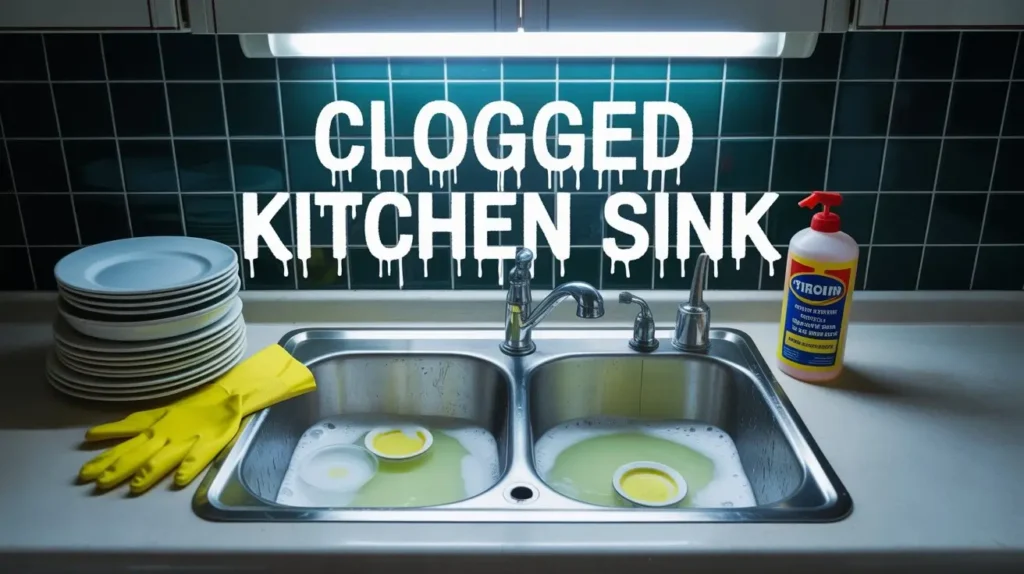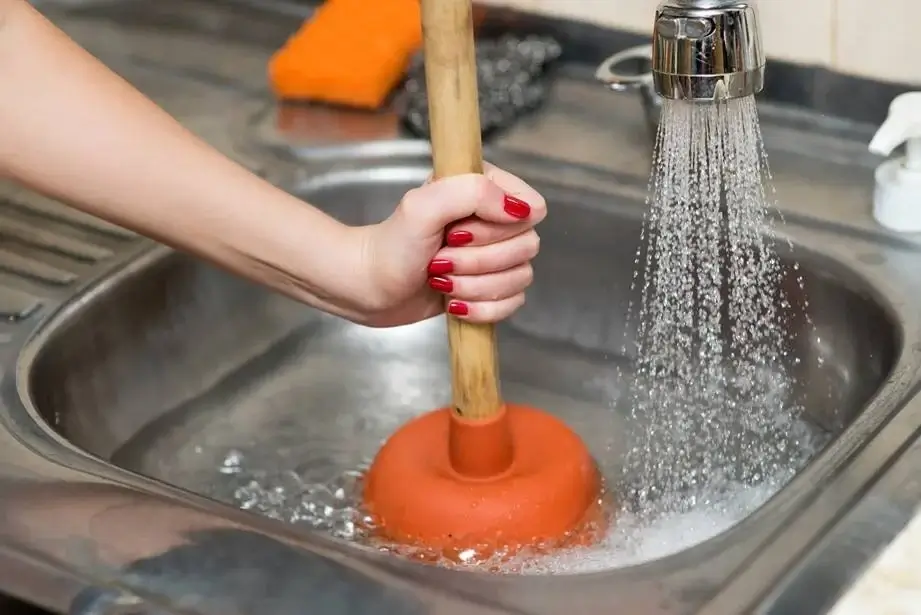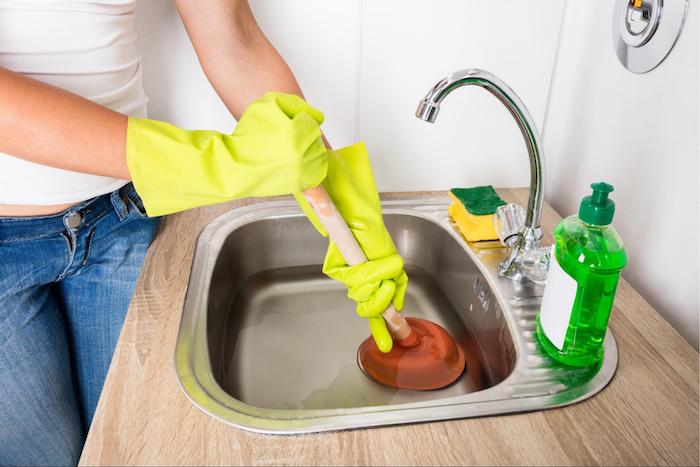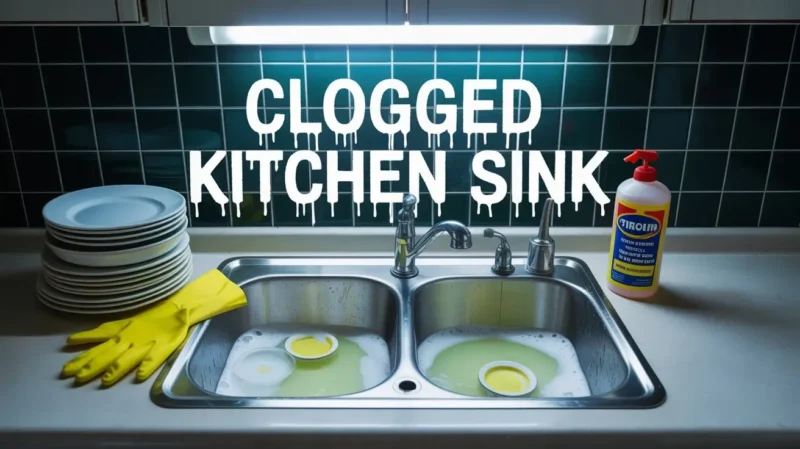A clogged kitchen sink is one of the most common household problems. It can disrupt your routine, create unpleasant odors, and even cause water damage if left untreated. According to plumbing industry surveys, nearly 80% of homeowners deal with sink clogs at least once a year. While calling a plumber is sometimes necessary, many issues can be solved with simple DIY methods.
In this guide, we’ll explore causes, quick fixes, and long-term solutions for a clogged kitchen sink. You’ll also learn how to prevent future blockages and keep your kitchen fresh and functional.

Content
Common Causes of Kitchen Sink Blockages
Food Waste and Grease
Grease, oils, and leftover food are the leading culprits. When grease cools, it solidifies and sticks to the pipe walls, trapping food particles.
Soap Scum and Residue
Over time, soap and detergents combine with minerals in water. This buildup narrows pipes and slows drainage.
Foreign Objects
Small utensils, wrappers, or even bottle caps can fall into the sink and block the drain.
Hard Water Deposits
Minerals in hard water cause scaling inside pipes, making them prone to clogs.
Signs of a Clogged Kitchen Sink

- Slow drainage after washing dishes.
- Standing water that won’t go down.
- Gurgling sounds from the drain.
- Foul odors rising from the sink.
Noticing these early signs helps you act before the problem worsens.
DIY Fixes for a Clogged Kitchen Sink
Hot Water Flush
Pouring boiling water directly into the drain can melt grease and loosen blockages. This simple trick solves many minor clogs.
Baking Soda and Vinegar
A natural cleaning solution—pour half a cup of baking soda followed by half a cup of vinegar. Let it fizz for 15 minutes, then flush with hot water.
Plunger Method
Using a sink plunger creates suction that can dislodge debris stuck in the drain. Ensure the overflow hole is sealed for better results.
Drain Snake or Auger
A plumbing snake can reach deep into pipes to break apart clogs. Hand-crank versions are affordable and easy to use.
When to Call a Professional Plumber
While DIY methods often work, some clogs are too stubborn. You may need professional help if:
- The sink clogs frequently.
- Multiple drains in your home are slow.
- There’s a foul sewage smell.
- Water backs up into other fixtures.
Professional plumbers use tools like hydro-jetting or camera inspections for lasting solutions.
Preventing a Clogged Kitchen Sink

Proper Waste Disposal
Never pour grease, oil, or coffee grounds into the sink. Dispose of them in a trash can instead.
Install a Sink Strainer
A strainer catches food particles and prevents them from entering the drain.
Run Hot Water Regularly
Flushing with hot water once a week keeps grease from hardening.
Use Enzyme Cleaners
Eco-friendly enzyme-based drain cleaners break down organic waste without damaging pipes.
According to EPA guidelines, natural cleaners are safer for the environment compared to harsh chemical drain openers.
Long-Term Kitchen Sink Maintenance Tips
- Clean sink surfaces daily to prevent residue buildup.
- Use vinegar flushes monthly to keep drains clear.
- Check pipes under the sink for leaks or damage.
- Educate family members about what should and shouldn’t go down the drain.
Consistent care reduces the chances of facing major clogs in the future.
Cost of Fixing a Clogged Kitchen Sink
The average cost of hiring a plumber for a clogged sink ranges from $150 to $350, depending on the severity. DIY solutions, however, often cost under $10 if you already have basic supplies at home.
Eco-Friendly Solutions
Many homeowners turn to chemical drain cleaners, but these products can damage pipes and harm the environment. Safer alternatives like baking soda, vinegar, and enzyme-based cleaners are not only effective for light clogs but also support long-term pipe health. Choosing eco-friendly methods is especially important during a kitchen renovation, when maintaining both function and sustainability matters most.
Conclusion:
Dealing with a clogged kitchen sink doesn’t have to be overwhelming. By understanding the causes, applying simple DIY fixes, and practicing regular maintenance, you can keep your kitchen sink running smoothly. For stubborn issues, professional help ensures long-lasting results. With the right approach, your sink remains clean, safe, and efficient.
FAQs about Clogged Kitchen Sink:
What is the best way to unclog a kitchen sink drain?
The best way is to use hot water, baking soda with vinegar, or a plunger for quick and safe results.
How do you unblock a badly blocked sink?
Use a drain snake or call a plumber for severe clogs that DIY methods can’t clear.
How do you unclog a kitchen sink with standing water?
Remove standing water, then plunge the sink or pour baking soda and vinegar before flushing with hot water.
Why is my kitchen sink backing up with water?
Your sink is backing up because grease, food, or debris has blocked the drainpipe, stopping water flow.

I’m Steve Hembree. I love to share my tips and tricks for home improvement, as well as provide ideas for how you can transform your space with DIY projects.



